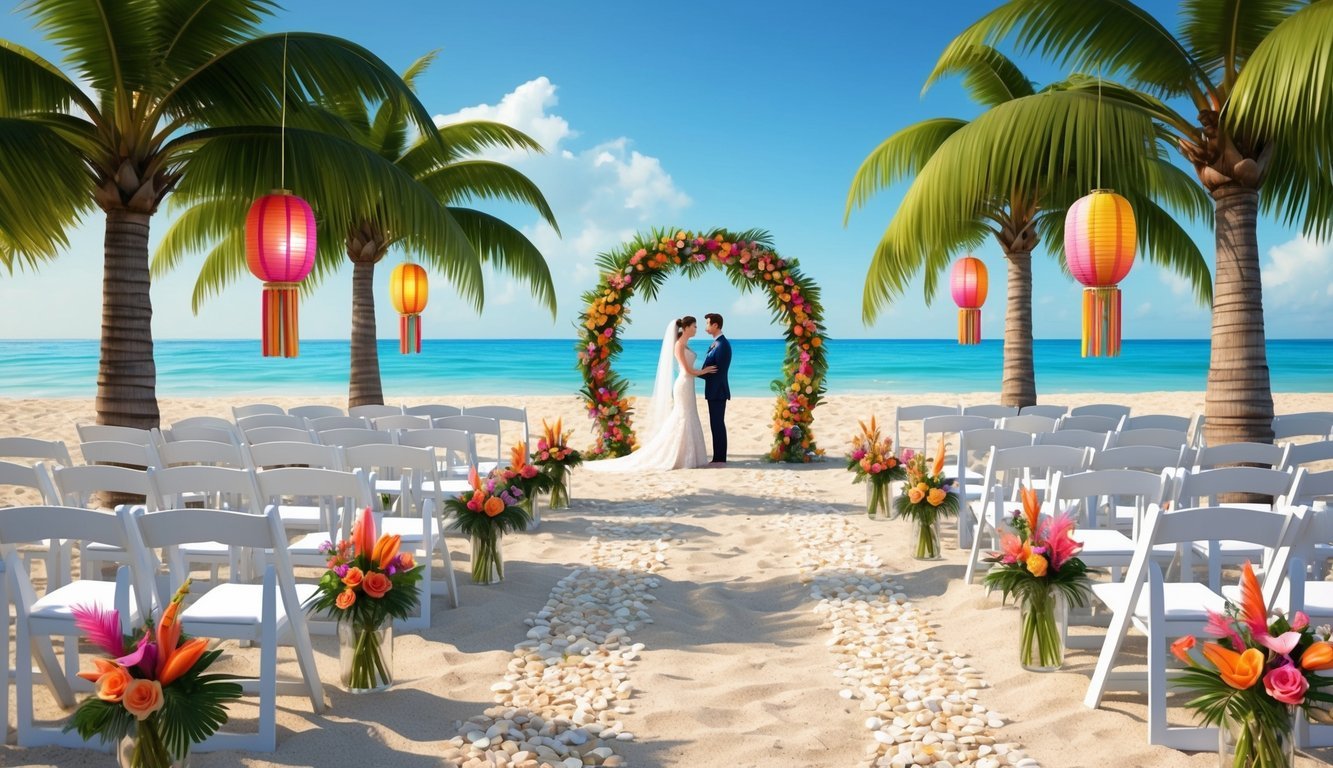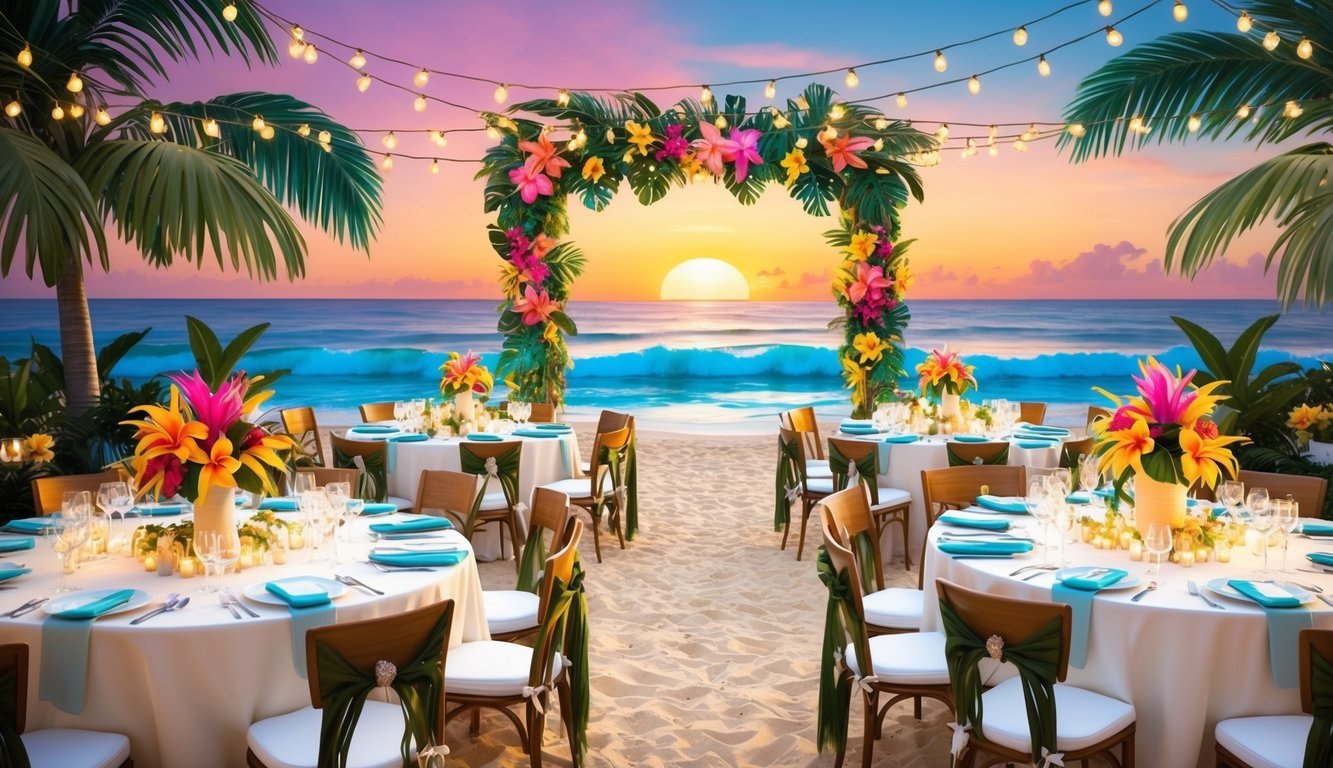Planning a destination wedding can be both exciting and daunting.
The idea of tying the knot in a beautiful location with loved ones is fantastic, but organizing all the details from afar can present its own set of challenges. By following best practices, I can ensure a smooth and memorable ceremony that reflects my style and makes my guests feel cherished.

Over the years, I’ve learned that careful planning is essential for a seamless experience.
It involves more than just picking a picturesque venue; there’s a lot to consider, from logistics to guest accommodations.
With the right approach, I can create a celebration that will be unforgettable for both me and my guests.
Choose a Scenic Venue

When I think about a destination wedding, the venue is key.
I want a place that not only looks stunning but also reflects my personality and love story.
A beach with soft waves, a charming vineyard, or a mountaintop with breathtaking views—these are the spots that come to mind.
They create a magical backdrop for my big day.
I also consider accessibility for my guests.
A scenic location should be easy to reach, so my friends and family can join in the celebration without hassle.
Researching local venues helps me find unique options that might not be on everyone’s radar.
I look for wedding packages that include gorgeous settings along with additional perks.
I love the idea of incorporating local culture into the decor, making the venue feel even more special.
Finding a place that offers flexibility for personal touches is important too.
In the end, I want a venue that not only captivates but also makes my wedding experience unforgettable.
Hire a Local Wedding Planner

When planning a destination wedding, hiring a local wedding planner can make everything smoother.
They know the area and can recommend the best venues, vendors, and spots for those perfect photos.
Local planners have valuable insights about the culture and customs that can enhance my wedding experience.
They often have established relationships with local vendors, which can save time and potentially money.
A local planner can also handle logistics that I might overlook.
From permits to transportation, they manage it all, allowing me to focus on enjoying the process.
It’s important to do some research and check reviews.
I always look for planners who specialize in destination weddings, ensuring they understand the unique challenges that come with them.
By working with someone who knows the locale well, I can bring my vision to life while minimizing stress.
Their expertise truly makes a difference in creating a memorable day.
Incorporate Destination-Inspired Decor

When planning my destination wedding, I found that using decor that reflects the local culture and surroundings can really elevate the experience.
For instance, if I’m getting married on the beach, seashells, starfish, and tropical flowers can create a beautiful setting.
I love the idea of incorporating locals’ craftsmanship into my decor.
Hand-painted ceramic pieces or traditional textiles can add authenticity and charm.
Using these elements makes the decor feel unique and tied to the location.
Adding travel-themed accents, like vintage suitcases, globes, or maps, can also be a fun touch.
These items not only serve as decor but can also spark conversation among guests about their own travel adventures.
Choosing a color palette inspired by the landscape is another way to connect my decor to the destination.
Bright blues and greens can reflect the ocean, while earthy tones can bring in the local terrain.
Using simple yet meaningful decor elements can really impress my guests and create a memorable atmosphere.
It’s all about bringing a piece of the destination to my ceremony, making it special and truly one-of-a-kind.
4) Plan a Welcome Party for Guests

Planning a welcome party is a great opportunity to kick off the festivities.
I want to gather everyone in one place before the main event.
It sets a fun tone and helps break the ice among guests.
For a destination wedding, I like to choose a relaxed setting, maybe a cocktail hour or a casual dinner.
This way, guests can mingle and start to connect.
The location can reflect the destination’s vibe, which adds to the experience.
Incorporating local elements is a fun touch.
I might consider hiring a mariachi band or serving signature cocktails inspired by the locale.
It gives guests a taste of what’s to come.
I also like to make sure to send out invites ahead of time.
This ensures everyone knows what to expect and can plan accordingly.
Keeping it simple and inviting creates a warm atmosphere that guests appreciate.
5) Consider Off-Peak Season Dates

Choosing to book my destination wedding during the off-peak season can save a significant amount of money.
Many venues and vendors offer discounts when business is slower, which can mean savings of 30 to 50%.
I find that off-peak months vary by location, so it’s worth doing a little research.
For example, if I’m looking at a beach wedding, I might consider the late fall or early spring when the weather is still pleasant, but fewer tourists are around.
In addition to cost benefits, I appreciate the more relaxed atmosphere.
With fewer weddings happening, the focus from vendors is often on creating a memorable day for me and my guests.
Booking during quieter months can also mean better availability with venues and accommodations.
This flexibility lets me customize the experience without worrying about conflicts with other events.
6) Arrange Group Travel Discounts

One of the best ways to ease the financial burden for my wedding guests is by arranging group travel discounts.
Most airlines offer special rates for groups, making it easier for family and friends to attend.
I usually reach out to airlines like American, Southwest, and United.
They often provide discounts of around 5% off their standard fares.
I also double-check that these rates are the lowest available.
Don’t forget about accommodation! Contact hotels near my venue to see if they can offer group rates.
Many hotels are willing to set aside room blocks at discounted prices for wedding parties.
This also helps keep everyone together.
Additionally, I consider planning group activities.
Not only does this enhance the experience, but it can also lead to better group rates.
Activities like excursions or dinners can often be booked at a reduced price for larger groups.
Communicating these options clearly with my guests is essential.
I include this information on my wedding website to make it easy for everyone to access.
Weather Considerations

When planning a destination wedding, I’ve learned that weather is a major player in the success of the event.
Choosing the right season and preparing for any unexpected weather can make a big difference for me and my guests.
Choosing the Right Season
I find that selecting the right season is crucial for a smooth wedding day.
Each season brings its own unique weather patterns, so I pay attention to the climate of the location.
- Spring: Generally mild, with blooming flowers. Perfect for outdoor ceremonies.
- Summer: Often warm and sunny, but be prepared for humidity and possible rain.
- Fall: Known for beautiful foliage and cooler temperatures, ideal for rustic themes.
- Winter: Offers a cozy atmosphere, but check for potential snow.
I also consider local events or holidays that might affect availability and costs.
Booking during off-peak times can save me money while ensuring venue options are plenty.
Preparing for Unexpected Weather
Even with my best efforts in choosing a season, I always plan for unexpected weather.
The unpredictability of rain, wind, or temperature changes can throw a wrench in my plans.
Here’s how I stay prepared:
- Outdoor Backup: If I choose an outdoor venue, I always have a backup plan, like a nearby indoor space.
- Weather Gear: I consider having items like umbrellas or shawls ready for guests.
- Flexible Timelines: I build some flexibility into my schedule to accommodate any changes.
Checking the weather forecast leading up to the day is also a smart move.
This way, I can make informed decisions about comfort measures for my guests.
Legal Requirements and Marriage Laws
Planning a destination wedding means navigating a mix of legal requirements and local marriage laws.
Understanding these details can help ensure that your big day goes smoothly and legally.
Understanding Local Laws
Every destination has its own set of marriage laws.
I’ve learned that some countries require a legal wedding ceremony performed by a civil registry officer or a religious minister.
It’s crucial to check if your chosen location recognizes foreign marriages, as some may not.
Additionally, be aware of any residency requirements.
Some places might ask you to be there for a specific period before you can marry.
Familiarizing myself with local customs can also be beneficial.
Not only does it help avoid potential issues, but it can also enhance my wedding experience.
Documentation Needed for a Destination Wedding
Gathering the right documentation is key to a seamless wedding process.
Generally, I need to provide:
-
Marriage License: Ensure I apply for it in advance, as some countries require it to be issued a certain number of days before the ceremony.
-
Witnesses: Most destinations require at least two witnesses over the age of 18. It’s smart to enlist friends or hire local witnesses.
-
Proof of Single Status: If I’ve been married before, I must provide a divorce decree or death certificate to prove I’m free to marry again.
-
Translation of Documents: If my documents aren’t in the local language, I may need to have them translated and certified.
Being aware of these requirements can save me time and stress closer to the wedding day.
Guest Experience and Accommodation
Creating a memorable experience for my guests starts with thoughtful planning around their accommodation and travel arrangements.
I want everyone to feel comfortable and excited, so I focus on coordinating group travel and planning some fun local excursions.
Coordinating Group Travel
I want to make the group travel process as smooth as possible.
I usually start by organizing a wedding room block at a hotel close to the ceremony venue.
This not only ensures availability but can often unlock discounted rates for my guests.
I then communicate essential information early on.
I send out links to the booked hotel and any alternative options.
This gives my guests time to compare and make financial arrangements.
I also consider a shuttle service from the hotel to the ceremony site.
It’s convenient and adds a touch of luxury, ensuring everyone arrives stress-free.
Planning Local Excursions
Incorporating local excursions can enhance the overall guest experience.
I often plan group activities to foster connection among guests.
Examples include guided tours, beach days, or culinary experiences exploring local cuisine.
I usually curate a list of recommended activities and share it on my wedding website.
This serves as a helpful resource for those looking to explore during their stay.
Including a welcome party can also set a fun tone.
It’s a great opportunity for guests to socialize before the main event.
I like to keep things casual, including games or local snacks to create a relaxed atmosphere.

